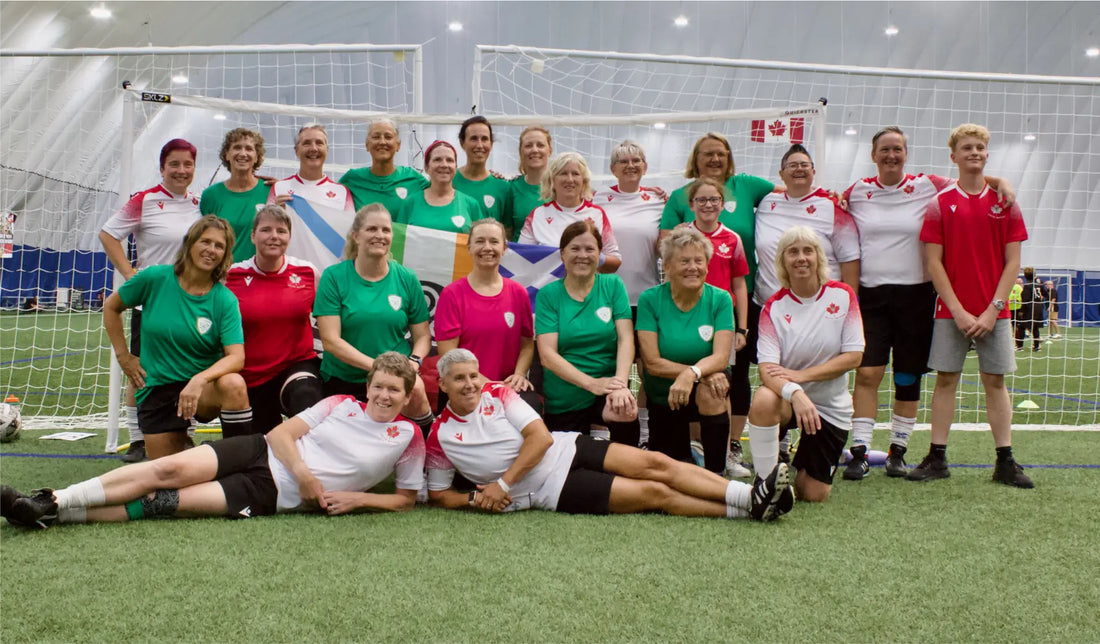
Welsh Soccer Star Leads Team into Historic International Canadian Walking Soccer Tournament
Share

The Celtic Nations squad visiting the Greater Toronto Area for the July 24 international women’s walking soccer tournament is led by playing coach and captain Mandy Gornicki. In her distinguished career, she was captain of the both the last trailblazing, unofficial Wales women’s side, and in 1993, the first Football Association of Wales team in UEFA qualifying. She also played in two FA Cup semi-finals – for Cardiff City versus Arsenal and with Bristol Rovers against Liverpool.
The boys at her school in Wales knew Mandy Gornicki was an excellent player, but there was no girls team for her to join. Eventually she would have a trailblazing career in international football, and now, at age 63, she is creating opportunities for women to play, through walking soccer.
“Growing up as a kid, I played football every day with the boys after school – and during school, in the breaks – but on Saturday, when they played for the local team, I wasn’t allowed to,” she recalled.
To get in a game, young Mandy had to be creative. “I put my shorts on underneath my school skirt, and then in the break, I’d take my skirt off to play football with the boys,” Gornicki recalled.
Her soccer skills were obvious to everyone. “I remember my teachers saying, ‘You are such a good footballer, and we wish you could be in the team,’” she said.
With soccer off the table, young Mandy tried other sports, like volleyball and field hockey. “I went in goal because I could kick the ball,” she said. Combat sports were also part of the mix. She represented Wales in judo as a teenager and was British champion in karate in 1993, at age 30.
That year, her well-rounded training took her to the semi-finals of UK Gladiators – a glitzy athletic competition that foreshadowed reality television – but in her 20s, Gornicki’s real ambitions were on the pitch. “I always loved football,” she said. “Football was what I wanted to do, and then when I left college and went into the army, I still wasn’t allowed to play football, because it was men only.”

The Football Association of Wales (FAW) banned women from using the pitches of its member clubs from 1922 to 1970. Even after the rule was lifted, women’s soccer was slow to develop in the in UK.
Gornicki finally found a women’s team at age 26, when she was serving in the army, based in England, and saw a newspaper ad for a club in Farnborough, Surrey.
She quickly established herself as a full-back winger, and not just for her club side, but also on a trailblazing team representing Wales against the other British home nations and Ireland.
With no recognition or support from the various football associations, the players paid their own way to international matches. “We would arrange friendlies with each other, as women, organizing it among ourselves,” she recalled.
Finally, in 1993 – that golden year with the Gladiators and the karate championship – the FAW decided to organize a women’s team to enter the UEFA qualifiers.
On Sept. 6, 1993, Gornicki made history as part of the first official Wales women team, in a friendly against Iceland. “The kit we wore had been used the night before by the boys under 20 team and it was quite big on most of our players – they had to literally tuck the shirt into the shorts, otherwise it would be around your knees – but a kit is a kit and it had a proper badge from the FAW,” she remembered.
Despite the poor fit and a lack of pay, Gornicki saw an improvement with the FAW funding transportation and hotels as well as travelling physios, doctors and nutritionists. “Suddenly there was this support network – we weren’t used to having one – so it was strange to get used to, but in a good way,” she said.
The FAW did find a way to save money with creative scheduling. In Spring 1994 they crammed matches away to Germany, Switzerland and Croatia into a single week to reduce travel costs.
In Zagreb, on the night before the third game, Gornicki received an ominous phone call. “The manager called me in, and I thought, ‘Oh, what have I done?’” she wondered. “That’s when he said he wanted me to be the captain – to lead them out! “It was a defining moment because you couldn’t really get anything better than that.”
At that point, her one regret was that she could not share the moment with her whole family. “My dad loved football with a passion – it was his thing and my thing – but he died when I was 19, so he never saw me play,” Gornicki said.
Gornicki’s success on the pitch was matched by a new career in the local police, but that brought a new challenge.
“When you are going through your first probationary year, you cannot get time off for anything, not even representative football,” she said. “I remember being in Cwmbran for central police training and thinking the girls on the team are training now to play Ireland. “Eventually something had to give, and I had to make a choice. My career had to come first, because that was my income, and we didn’t get paid for international football.”
Gornicki continued in club football with Bristol Rovers and Cardiff City (playing in FA Cup semi-final matches with both) before finishing her 11-aside career with her local club, Bridgewater Town at age 49.
She stayed in shape by running. After one workout she met her husband for breakfast in a café where she met a group that had just come from their own training – for walking soccer. That conversation brought her back to the beautiful game. After joining a local club, Gornicki founded Celtic Nations Walking Football, a representative team that enters international tournaments in various age classes.
Always mindful that British women over 60 could not play soccer in their youth, Gornicki is proud of the opportunities her club has created for them to play in tournaments – especially one particular 72-year-old. “She cried because she never thought she would have an opportunity to play football.”
Gornicki will lead a Celtic Nations squad in Canada with players in their 40s and up from Wales, Scotland, Ireland and Cornwall. They will be part of North America's first women's international walking soccer tournament, taking on the Team Canada over 50s, the Ontario Trilliums team and the host Toronto Loons.
By Mike Winterburn

